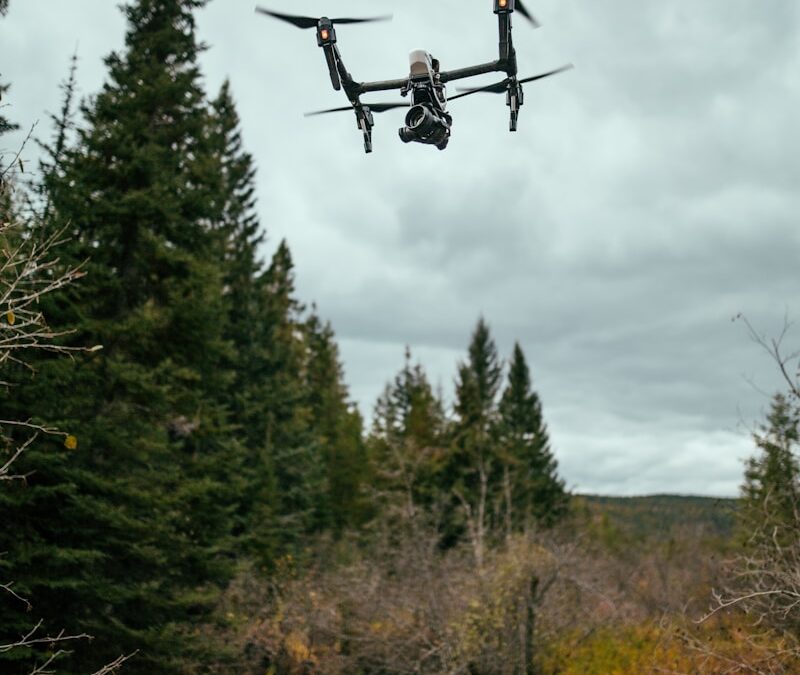How Artificial Intelligence is Revolutionizing Drone Operations in Environmental Conservation
The Impact of AI-Driven Drones on Environmental Monitoring
In today’s rapidly advancing technological landscape, AI-driven drones for environmental monitoring are playing a crucial role in transforming the way we approach conservation and resource management. As nations like Saudi Arabia and the UAE prioritize sustainability and environmental protection, the integration of Artificial Intelligence (AI) into drone technology has become a game-changer. These drones, powered by sophisticated AI algorithms, are capable of performing complex tasks such as monitoring air quality, assessing vegetation health, and detecting changes in land use. This technology not only enhances the precision and efficiency of environmental monitoring but also provides real-time data that can be used to make informed decisions, ultimately contributing to the sustainability goals of the region.
In Saudi Arabia, where environmental conservation is becoming increasingly important, AI-driven drones are being deployed to monitor the vast desert landscapes, track sand dune movements, and assess the health of native flora. These drones use AI to analyze large datasets, identify patterns, and provide actionable insights that help in preserving the delicate ecosystems of the region. For instance, AI algorithms can detect subtle changes in vegetation cover that may indicate the early stages of desertification, allowing for timely intervention and mitigation measures. Similarly, in the UAE, AI-powered drones are being used to monitor marine environments, track coral reef health, and detect illegal fishing activities, all of which are vital for maintaining the biodiversity of the region’s coastal ecosystems.
The adoption of AI-driven drones for environmental monitoring is not just about protecting natural resources; it also presents significant opportunities for business success in the Middle East. By leveraging AI technology, businesses can offer innovative solutions that address the growing demand for environmental services. For example, companies specializing in AI-driven drone services can provide governments and organizations with accurate, real-time data on environmental conditions, helping them to comply with regulatory requirements and achieve their sustainability targets. This not only enhances the reputation of these businesses but also positions them as leaders in the rapidly growing field of environmental technology in Saudi Arabia, the UAE, Riyadh, and Dubai.
AI and Drones: Transforming Wildlife Tracking and Conservation Efforts
The role of AI-driven drones for environmental monitoring extends beyond tracking environmental changes; it is also revolutionizing wildlife conservation efforts across the Middle East. In regions like Saudi Arabia and the UAE, where wildlife conservation is a top priority, AI-powered drones are being used to monitor endangered species, track migration patterns, and detect illegal poaching activities. These drones are equipped with advanced AI algorithms that enable them to recognize and follow specific animals, even in challenging terrains such as deserts, mountains, and dense forests. By providing real-time data on wildlife populations and their habitats, AI-driven drones are helping conservationists make more informed decisions about how to protect these species and preserve their ecosystems.
In Saudi Arabia, for instance, AI-driven drones are being used to monitor the Arabian oryx, a species that was once on the brink of extinction. By using AI to track the movements of these animals, conservationists can better understand their behavior, identify threats to their survival, and implement targeted conservation strategies. Similarly, in the UAE, AI-powered drones are being deployed to monitor the critically endangered hawksbill turtles, tracking their nesting sites and migration routes. The data collected by these drones is invaluable for informing conservation efforts and ensuring the long-term survival of these species.
The impact of AI-driven drones on wildlife conservation is not limited to government efforts; it also presents significant opportunities for businesses and entrepreneurs in the Middle East. Companies that specialize in AI-driven drone technology can offer a range of services to support conservation efforts, from providing real-time wildlife tracking data to developing custom AI algorithms for specific conservation projects. By aligning their services with the environmental priorities of Saudi Arabia, the UAE, Riyadh, and Dubai, these businesses can not only contribute to the protection of the region’s natural heritage but also achieve commercial success in a rapidly growing market. Moreover, the use of AI-driven drones in conservation efforts enhances the global reputation of the Middle East as a leader in innovation and sustainability, attracting further investment and fostering long-term economic growth.
#AIinDrones, #EnvironmentalMonitoring, #WildlifeTracking, #AdvancedTechnology, #SaudiArabia, #UAE, #Riyadh, #Dubai, #ArtificialIntelligence, #BusinessSuccess













